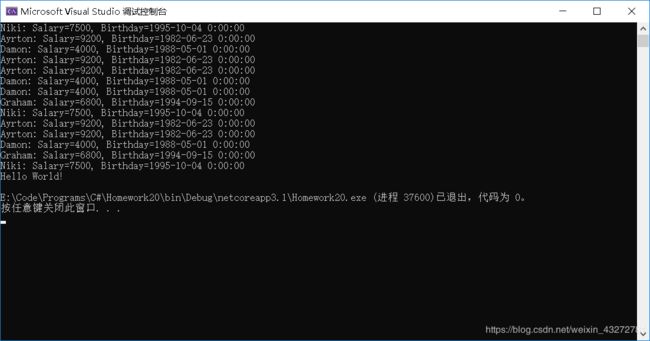C#——《C#语言程序设计》实验报告——综合练习——委托、Lambda表达式、LINQ、接口
问题描述
1、使用委托、Lambda表达式、LINQ等知识完成以下内容:(本题35分)
(1)要求定义Employee类,带有Name属性(string类型),带有Birthday属性(DateTime类型),带有Salary属性(double类型);重载ToString()方法,将信息以适当格式输出。[8分]
(2)定义一个委托如下 :
delegate bool EmployeePredicate(Employee emp);写一个静态方法FindEmployee,根据filter参数在数组中查找符合条件的Person实例,方法声明为:[6分]
static ListFindEmployee(Employee[] emps, EmployeePredicate t) (3)写一个静态方法FilterBySalary,使之符合委托EmployeePredicate定义,当Salary超过7000时返回true。[3分]
(4)在主方法中添加代码,结合(2)和(3),将工资超过7000的员工找出来并打印。[3分]
(5)编写一个静态类MyExtensions,其中有一个静态方法Eighties,扩展DateTime类型的功能。如日期符合“80后”定义则返回true,否则返回false。其中年份数据可通过 DateTime的Year属性访问到。[5分]
private static bool IsEighties(DateTime dt)(6)利用(5)中扩展方法写一个lambda表达式,调用(2)中方法,把80后员工找出来并打印。[5分]
(7)利用LINQ技术,把80后员工找出来,按工资从高到低排序,并打印。[5分]
主方法中已提供以下代码和数据:
public static void Main(string[] argv)
{
Employee[] employees = new Employee[] {
new Employee { Name = "Damon", Birthday = new DateTime(1988, 5, 1), Salary = 4000 },
new Employee { Name = "Niki", Birthday = new DateTime(1995, 10, 4), Salary = 7500 },
new Employee { Name= "Ayrton", Birthday = new DateTime(1982, 6, 23), Salary = 9200 },
new Employee { Name= "Graham", Birthday = new DateTime(1994, 9, 15), Salary = 6800 }
};
}2、Array类的静态Sort方法要求数组中的元素是可比较的。[16分]
1)扩展第1题中Employee类的功能,使之实现泛型IComparable
接口(其中定义了方法int CompareTo(T p)),按Salary进行比较。(第1题中已答出的代码不需要重复写。)[4分] 2)如果需要以其它方式对Employee对象进行排序,就需要自己创建一个类EmployeeComparer,实现泛型IComparer
接口(其中定义了方法int Compare(T a, T b)),它独立于要比较的类,因此需要两个参数进行比较。 写个一EmployeeComparer类,继承IComparer
,内部包含一个整型Sort属性。当Sort为0时按Salary进行比较,为1时按Name排序,为2时按DateTime排序。其中string类和DateTime类均已实现IComparable接口。[8分] 3)在主方法中实现按Salary和Name的两种排序。[4分]
解决方案
using System;
using System.Collections.Generic;
using System.Linq;
namespace Homework20
{
/**
1、使用委托、Lambda表达式、LINQ等知识完成以下内容:(本题35分)
(1)要求定义Employee类,带有Name属性(string类型),带有Birthday属性(DateTime类型),带有Salary属性(double类型);重载ToString()方法,将信息以适当格式输出。[8分]
(2)定义一个委托如下 :
delegate bool EmployeePredicate(Employee emp);
写一个静态方法FindEmployee,根据filter参数在数组中查找符合条件的Person实例,方法声明为:[6分]
static List FindEmployee(Employee[] emps, EmployeePredicate t)
(3)写一个静态方法FilterBySalary,使之符合委托EmployeePredicate定义,当Salary超过7000时返回true。[3分]
(4)在主方法中添加代码,结合(2)和(3),将工资超过7000的员工找出来并打印。[3分]
(5)编写一个静态类MyExtensions,其中有一个静态方法Eighties,扩展DateTime类型的功能。如日期符合“80后”定义则返回true,否则返回false。其中年份数据可通过 DateTime的Year属性访问到。[5分]
private static bool IsEighties(DateTime dt)
(6)利用(5)中扩展方法写一个lambda表达式,调用(2)中方法,把80后员工找出来并打印。[5分]
(7)利用LINQ技术,把80后员工找出来,按工资从高到低排序,并打印。[5分]
主方法中已提供以下代码和数据:
public static void Main(string[] argv)
{
Employee[] employees = new Employee[] {
new Employee { Name = "Damon", Birthday = new DateTime(1988, 5, 1), Salary = 4000 },
new Employee { Name = "Niki", Birthday = new DateTime(1995, 10, 4), Salary = 7500 },
new Employee { Name= "Ayrton", Birthday = new DateTime(1982, 6, 23), Salary = 9200 },
new Employee { Name= "Graham", Birthday = new DateTime(1994, 9, 15), Salary = 6800 }
};
}
*/
/**
2、Array类的静态Sort方法要求数组中的元素是可比较的。[16分]
1)扩展第1题中Employee类的功能,使之实现泛型IComparable接口(其中定义了方法int CompareTo(T p)),按Salary进行比较。(第1题中已答出的代码不需要重复写。)[4分]
2)如果需要以其它方式对Employee对象进行排序,就需要自己创建一个类EmployeeComparer,实现泛型IComparer接口(其中定义了方法int Compare(T a, T b)),它独立于要比较的类,因此需要两个参数进行比较。
写个一EmployeeComparer类,继承IComparer,内部包含一个整型Sort属性。当Sort为0时按Salary进行比较,为1时按Name排序,为2时按DateTime排序。其中string类和DateTime类均已实现IComparable接口。[8分]
3)在主方法中实现按Salary和Name的两种排序。[4分]
*/
class Employee : IComparable
{
public string Name;
public DateTime Birthday;
public double Salary;
public override string ToString()
{
return string.Format("{0}: Salary={1}, Birthday={2}", Name, Salary, Birthday);
}
public int CompareTo(Employee emp)
{
return (int)(Salary - emp.Salary);
}
}
public static class MyExtensions
{
public static bool IsEighties(this DateTime d)
{
return d.Year > 1979 && d.Year < 1990;
}
}
class EmployeeComparer : IComparer
{
public int Sort { get; set; }
public EmployeeComparer(int sort)
{
Sort = sort;
}
public int Compare(Employee e1, Employee e2)
{
switch (Sort)
{
case 0:
return (int)(e1.Salary - e1.Salary);
case 1:
return e1.Name.CompareTo(e2.Name);
default:
return e1.Birthday.CompareTo(e2.Birthday);
}
}
}
class Program
{
delegate bool EmployeePredicate(Employee emp);
static List FindEmployee(Employee[] emps, EmployeePredicate t) {
List results = new List();
foreach (Employee p in emps)
{
if (t(p))
results.Add(p);
}
return results;
}
private static bool FilterBySalary(Employee emp) {
return emp.Salary > 7000;
}
public static void Main(string[] args)
{
Employee[] employees = new Employee[] {
new Employee { Name = "Damon", Birthday = new DateTime(1988, 5, 1), Salary = 4000 },
new Employee { Name = "Niki", Birthday = new DateTime(1995, 10, 4), Salary = 7500 },
new Employee { Name= "Ayrton", Birthday = new DateTime(1982, 6, 23), Salary = 9200 },
new Employee { Name= "Graham", Birthday = new DateTime(1994, 9, 15), Salary = 6800 }
};
List high = FindEmployee(employees, FilterBySalary);
foreach (Employee emp in high)
Console.WriteLine(emp);
List eighties = FindEmployee(employees, p => p.Birthday.IsEighties());
foreach (Employee emp in eighties)
Console.WriteLine(emp);
var eighties2 = from emp in employees
where emp.Birthday.IsEighties() == true
orderby emp.Salary descending
select emp;
foreach (Employee emp in eighties2)
Console.WriteLine(emp);
Array.Sort(employees);
foreach (Employee emp in employees)
Console.WriteLine(emp);
Array.Sort(employees,new EmployeeComparer(1));
foreach (Employee emp in employees)
Console.WriteLine(emp);
Console.WriteLine("Hello World!");
}
}
}
参考答案
//1、
//(1)
class Employee
{
public string Name { get; set; }
public DateTime Birthday { get; set; }
public double Salary { get; set; }
public override string ToString()
{
return string.Format("{0}: Salary={1}, Birthday={2}", Name, Salary, Birthday);
}
}
//(2)
private static List FindEmployee(Employee[] ps, EmployeePredicate t)
{
List results = new List();
foreach (Employee p in ps)
{
if (t(p))
results.Add(p);
}
return results;
}
//(3)
private static bool FilterBySalary(Employee emp)
{
return emp.Salary >= 7000;
}
//(4)
List high = FindEmployee(employees, FilterBySalary);
foreach(Employee emp in high)
Console.WriteLine(emp);
//(5)
public static class MyExtensions
{
public static bool IsEighties(this DateTime d)
{
return d.Year > 1979 && d.Year < 1980;
}
}
//(6)
List eighties = FindEmployee(employees, p => p.Birthday.IsEighties());
foreach(Employee emp in eighties)
Console.WriteLine(emp);
//(7)
var eighties2 = from emp in employees
where emp.Birthday.IsEighties() == true
orderby emp.Salary descending
select emp;
foreach (Employee emp in eighties2)
Console.WriteLine(emp);
//2、
class Employee : IComparable
{
public string Name { get; set; }
public DateTime Birthday { get; set; }
public double Salary { get; set; }
public override string ToString()
{
return string.Format("{0}: Salary={1}, Birthday={2}", Name, Salary, Birthday);
}
public int CompareTo(Employee emp)
{
return (int)(Salary - emp.Salary);
}
}
class EmployeeComparer : IComparer
{
public int Sort { get; set; }
public EmployeeComparer(int sort)
{
Sort = sort;
}
public int Compare(Employee e1, Employee e2)
{
switch(Sort)
{
case 0:
return (int)(e1.Salary - e1.Salary);
case 1:
return e1.Name.CompareTo(e2.Name);
default:
return e1.Birthday.CompareTo(e2.Birthday);
}
}
}
运行结果
参考文章
https://www.cnblogs.com/skm-blog/p/4229487.html
https://www.cnblogs.com/forever-Ys/p/10315830.html
